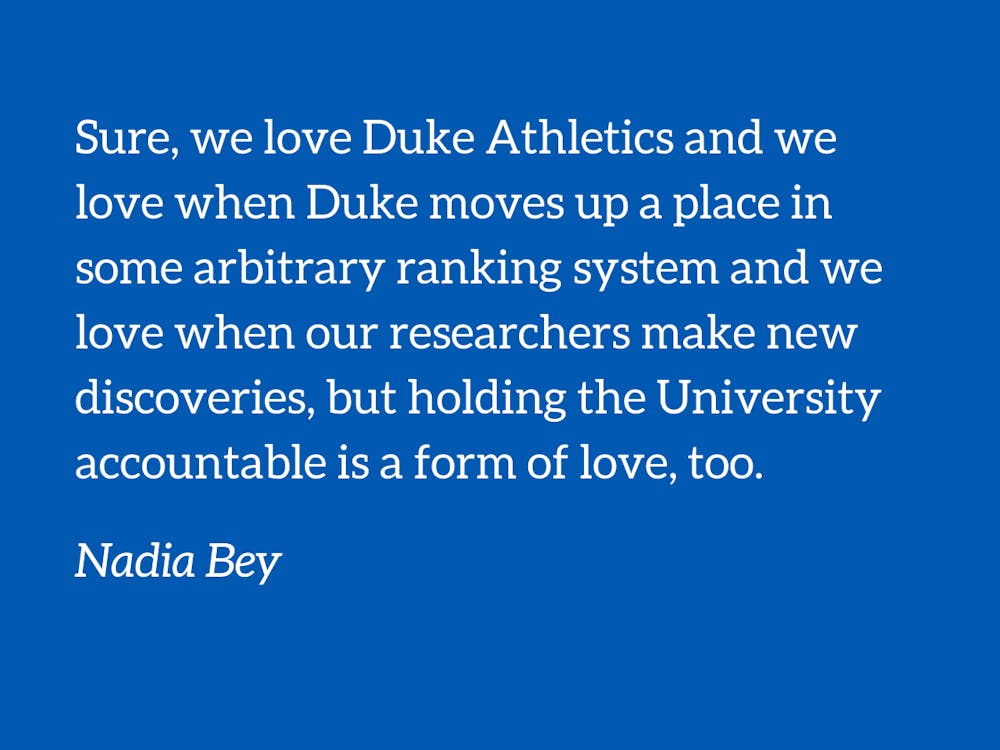As I rewrite this column for the third time, I find myself questioning where things will end. Not just this article or my year as managing editor, but my time at Duke. In a way, The Chronicle and Duke are almost inseparable for me; I went to one info session during O-Week and never looked back. Six semesters later, it feels like I’m riding a conveyor belt to the finish line and there’s been no time to stop and process anything that’s happened thus far.
Most of us come to Duke to actualize whatever dream version of ourselves exists in our minds, pulling together all kinds of parts on the assembly line so we fall off the conveyor belt knowing exactly what the future is going to look like and what our purpose is. I decided to join The Chronicle because I wanted to try news writing and found a greater purpose along the way: learning more about my university and having the power to highlight the experiences of the people that study and work here. It sounds idyllic—and it is, sometimes. But sometimes it’s hard.
Frankly, it’s been a really long year. Breaking story after breaking story, change after change, death after death after death. On top of trying to meet the academic goals I had set for myself and maintain some semblance of a personal life, I felt a crushing sense of responsibility to the community and to the other Chronicle staff. If I didn’t write about something, then who would? If we didn’t shine a light on every shadow, would the darkness continue to grow? If I stepped away, would the others be fine without me? Did our reporting even matter at all?
It took some time for me to remember why I stuck with The Chronicle in the first place, let alone ascend to the second-highest position in the organization: because I want to see things get better. As James Baldwin wrote, “If I love you, I have to make you conscious of the things you don’t see.” As Matthew wrote in his farewell column and Milla quoted in her speech at editor elections, “The Chronicle is a love letter to Duke.”
Sure, we love Duke Athletics and we love when Duke moves up a place in some arbitrary ranking system and we love when our researchers make new discoveries, but holding the University accountable is a form of love, too. This is not a job we do to make Duke look bad. We do this work because we know our peers, instructors and service staff are facing a myriad of personal challenges, and institutional betrayal—wrongdoings by an institution or failure to adequately address wrongdoings and support those affected—can add a greater burden.
I want The Chronicle to be better, too. I want us to be more transparent about why we make the decisions that we do and be more representative of the communities we cover. I want us to build greater trust within the community so we don’t have to write that we were unable to reach members of a certain demographic or question why certain people or organizations won’t talk to us.
Ultimately, The Chronicle is its own community, one that is interdependent with the rest of the University. It is this community that made me comfortable going for leadership positions in the first place: I had the ambition, but Stefanie was a cheerleader from day one, and Jake gave me a vote of confidence, and Matthew gave me access to our editing system a year early because he had a feeling I might need it. It’s easy to feel alone when you’re reporting on Duke, but it’s not always lonely. Maybe I didn’t call Maria for advice as frequently as she had anticipated, but I know she’ll always be there. And of course, it would be remiss of me to not mention the other members of news uppermast, who put up with me sending random things in the group chat at all hours of the day and know how to defuse messy situations.
All of this is to say, I don’t know how my time at The Chronicle or at Duke is going to end, but I know I don’t regret the steps I took to get here. The things I’ve learned here have shaped the rest of my life in so many ways, and I think I’ve come out better. This may be a big ask for one person, but I’m hoping for the same for Duke—that the version I leave behind will be a little bit better than the one I first encountered.
Nadia Bey is a Trinity junior and was managing editor of The Chronicle’s 117th volume. She would like to thank everyone that gave her their time and apologize to the people she definitely pissed off at some point. She also wants to apologize for stressing her mother out every time she starts a new investigation. It will happen again. To all the people that saw greatness in a girl that wants to do literally everything under the sun and helped her move forward, thank you.
Get The Chronicle straight to your inbox
Sign up for our weekly newsletter. Cancel at any time.

Nadia Bey, Trinity '23, was managing editor for The Chronicle's 117th volume and digital strategy director for Volume 118.

